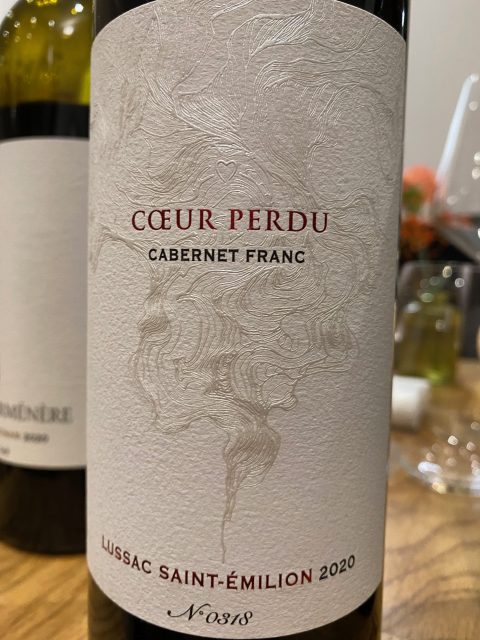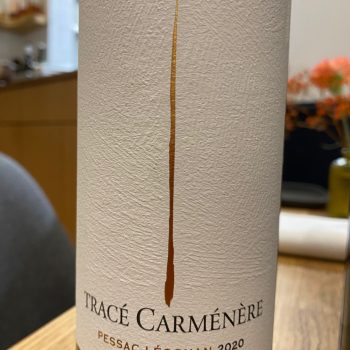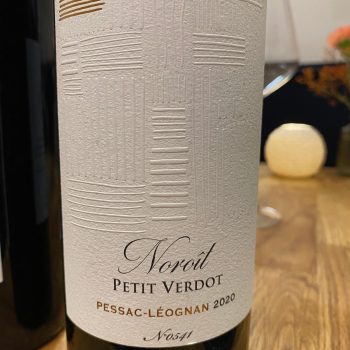This website uses cookies so that we can provide you with the best user experience possible. Cookie information is stored in your browser and performs functions such as recognising you when you return to our website and helping our team to understand which sections of the website you find most interesting and useful.
Vignobles André Lurton releases three new single varietal micro-cuvées
December sees the release of three exciting new single varietal micro-cuvées from Vignobles André Lurton. I was lucky enough to be the first journalist to taste these from bottle when I met up with Jacques Lurton and Claire Dawson in Bordeaux last week, just after their bottling.

The project is a strikingly simple one – to take some of the best single parcels from Vignobles André Lurton’s various estates and to vinify and bottle them separately as a way of revealing as precisely as possible the interaction between terroir and grape varietal at the most micro-level.
The production of each wine is, inevitably, miniscule – the nature of the project means that it could not be otherwise – with between 800 and 1200 bottles of each expression.
At present, and for this inaugural release, these micro-cuvées come in three varieties – indeed, in three varietals: ‘Noroît’ Petit Verdot, ‘Coeur Perdu’ Cabernet Franc and ‘Tracé’ Carménère. Each comes from a separate vineyard – Noroît is from de Rochemorin in Pessac-Léognan, Coeur Perdu is from Barbe Blanche in Lussac-Saint-Emilion and Tracé is from de Cruzeau in Pessac-Léognan.
The initial release is from the fabulous 2020 vintage. This is undoubtedly serendipitous, as the luminous, fresh, crisp and brilliant characteristics of the vintage only accentuate further the clarity of the very direct and immediate expression of both the single varietal and the single terroir that lie at the heart of this project.
These are exciting wines that genuine Bordeaux lovers will no doubt want to seek out. They are to be sold to a limited number of exclusive restaurants, through Vignoble André Lurton’s online shop (www.boutique.andrelurton.com) and directly from the shop at Château La Louviere – but all in very limited quantities. The wines are offered either separately or in a mixed case and retail for €40 per bottle (inclusive of tax).
The wines – including tasting notes
Tracé Carménère
This is sourced from one single, elongated, parcel (hence the name) of pure Carménère from Chateau de Cruzeau in the appellation of Pessac-Léognan. This is a legendarily challenging grape variety to grow, particularly in Bordeaux. The difficulty is in achieving optimal ripeness, with the maturation of the juice (as gauged by the level of sugar and hence potential alcohol) always significantly preceding phenolic maturity (the ripeness of the skins and pips and, crucially, the tannins they contain). The skins require a lot of heat and sun exposure for their tannins to soften. The result, so often is long hang times and elevated alcohol levels (though Tracé 2020 is an impressively moderate 12.5%). The management of the skins during maturation also requires considerable attention. For Tracé, vinification takes place in specially-designed round wooden vats (of 9 hectolitres). These sit on rollers, allowing the delicate rotation of the vat. The effect is an extremely gentle extraction that can be carefully monitored and readily adjusted. The wine is aged in a combination of 2 and 3 years old barrels to avoid adding further to the already naturally ‘toasty’ character of the varietal.

Tracé Carménère 2020
- Appellation: Pessac-Léognan
- Vineyard: Château de Cruzeau
- Parcel size: 0.19 hectares (8 rows)
- Soil: deep gravel
- Exposition: due South
- Planting density: 5000 per hectare
- Average age of the vines: 17 years
- Pruning method: Guyot Double
- Picking method: manual
- Production: 800 bottles
- Vinification method: fermentation in 9 hl wooden vats, malolactic and aging in barrel
Tasting note
Tracé Carménère 2020: (Pessac-Léognan; 100% Carménère; 12.5% alcohol). Boisterous, rich and punchy. Smoky and quite gamey, with a lovely slightly saline minerality. This is somewhat broader shouldered and richer than the other two other micro-cuvées, as you’d expect, but it also manages to be tender, tight and well-structured, with a nicely defined spine. It is distinctly spicy, but not overwhelmingly so, with hoisin, Chinese five spice, cinnamon and clove notes. Texturally, this is very soft on the entry and quite rich and viscous on the densely-packed mid-palate. A sappy, juicy fruit – dark crushed berries but also the lift and vibrancy of redcurrant. The acidity plays a nice role in the structure of the wine and the overall impression is of something dense, charged and powerful, yet fine, refined and elegant – in short, tense, vital and energetic. 92.
Coeur Perdu Cabernet Franc
This is sourced from the most South-Eastern of the plots of the Chateau Barbe Blanche vineyard in Lussac St-Emilion, producing the very best Cabernet Franc of the estate. The wine is named to honour the memory of those troops, invariably American, who were hospitalised at the end of the first world war in the buildings of the estate and whose etchings and engraving can still be found on the walls of the cellar. Many of those engravings were clearly inspired by the romantic attachments of the injured soldiers made during their recuperation and the name of the wine (‘lost’ or ‘broken heart’ in English) imagines the pain of their return to the US (and of the loved ones of those who never returned). The wine is vinified in essentially the same way as Tracé, producing the same gentle extraction. The only differences are the addition of some stems, the use of a little press wine to bring additional depth and body to the free-run juice and aging in 50 per cent new oak (lightly toasted).
 Coeur Perdu Cabernet Franc 2020
Coeur Perdu Cabernet Franc 2020
- Appellation: Lussac St-Emilion
- Vineyard: Château Barbe Blanche
- Parcel size: 0.2 hectares
- Soil: limestone-clay
- Exposition: South-East (on the limestone plateau)
- Planting density: 5500 per hectare
- Average age of the vines: 40 years
- Pruning method: Guyot Double
- Picking method: mechanical
- Production: 1200 bottles
- Vinification method: fermentation in 9 hl wooden vats, malolactic and aging in barrel (50% of which are new)
- Vineyard management: in conversion to organic viticulture
Tasting note
Coeur Perdu Cabernet Franc 2020: (Lussac St-Emilion; 100% Cabernet Franc; 14% alcohol).. This is beautiful and, perhaps for now, my favourite of the three micro-cuvées (but then I have always had something of a soft-spot for the aromatic purity and expressiveness of Cabernet Franc). This is intense and, above all, intensely herbal and floral – with lots of evident Cabernet pyrazine notes. On the palate it is gentle, a little austere and held-back, ultra-soft on the entry and with a very elegant, stylish and sleek frame – a perfect vehicle for the dark berry fruit and subtly floral elements that are at the heart of this wine. Pure, focused, crystalline and very characteristic of the vintage. It’s a little haunting in personality and has that almost crypt-like calm tranquillity of both the varietal and the vintage. It almost feels subterranean and reflects the sombre image of its name. I find this beautifully composed and very harmonious. Like all the best Cabernet Franc it’s a little introvert and quite intellectual. 93+.
Noroît Petit Verdot
This is sourced from the most North-Westerly parcel of the vineyard of de Rochemorin in Pessac-Léognan. ‘Noroît’ is the vernacular French name for a ‘nor’westerly’, a wind or breeze from the north west. The parcel itself is on a well-drained deep gravel soil planted with a new Petit Verdot clone, 1058. Petit Verdot is an extremely vigorous varietal and needs to be grow on soils prone to hydric stress. It, too, benefits from a long hang time as it tends to be late ripening. The result, as here, is an intensely coloured wine that is relatively high in acidity, often with a nutty and, above all, peppery aromatic profile. It is also a varietal prone in Bordeaux to brutal tannins and so needs a gentle maceration, as here, with very little pumping over. Noroît is vinified in a manner very similar to the other two micro-cuvées, with press wine (extracted from a vertical press) incorporated with the free run juice as with Coeur Perdu. Petit Verdot has a natural affinity with quality wood and here is aged for 12 months in French oak barrels, 50 per cent of which are new.
 Noroît Petit Verdot 2020
Noroît Petit Verdot 2020
- Appellation: Pessac-Léognan
- Vineyard: Château de Rochemorin
- Parcel size: 0.2 hectares
- Soil: deep gravel over a clay sub-soil
- Exposition: South
- Planting density: 7700 per hectare
- Average age of the vines: 5 years (clone 1058)
- Pruning method: Guyot Double
- Picking method: manual
- Production: 1200 bottles
- Vinification method: fermentation in 9 hl wooden vats, malolactic and aging in barrel (50% of which are new).
Tasting note
Noroît Petit Verdot 2020: (Pessac-Léognan; 100% Petit Verdot; 13% alcohol). This, too, is a little smoky and meaty, but rather closer to the slightly austere and serious Coeur Perdu than the more boisterous and effervescent Tracé in style. There’s a lovely note of cedar already. And, again like the Coeur Perdu, a beautifully luminous almost crystalline, limpid mid-palate charged with fresh, crunchy dark berry fruits (loganberry and raspberry above all). At first it’s not as peppery as you expect, but with more air-time (as it were) assorted crushed peppercorn notes gradually reveal themselves, but never in a dominant way. We have great purity and precision here – a very direct and clear expression of the varietal. I love the subtle floral element that I was not really expecting and that linger on the finish – hibiscus perhaps. Tender, lithe, sumptuous. 92+.
Related news
Burgundy 2023 en primeurs: cautious optimism
SWR: lighter bottles for entry level wines is 'the wrong message'
Ribera del Duero challenges 'out of date' perceptions in UK market

